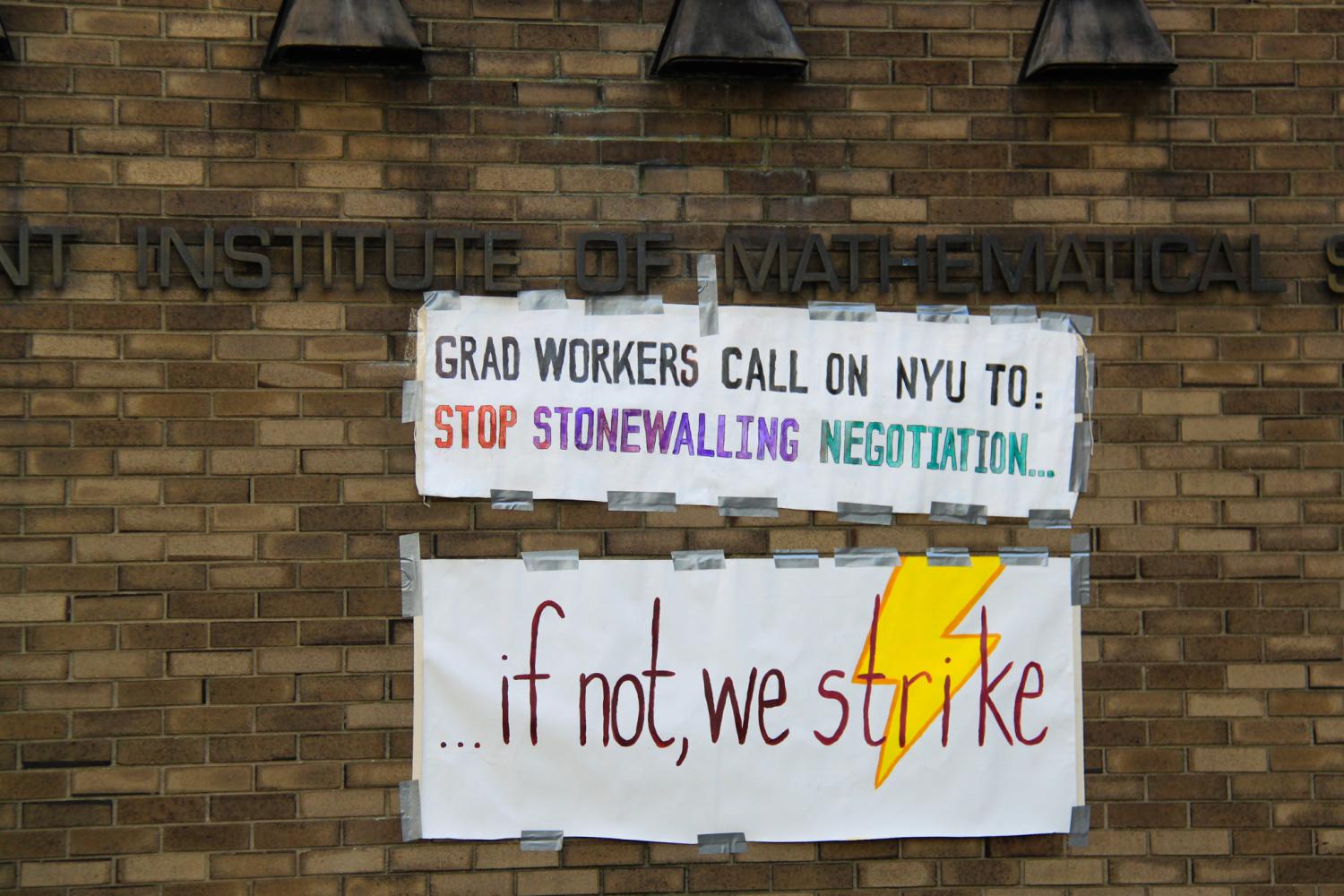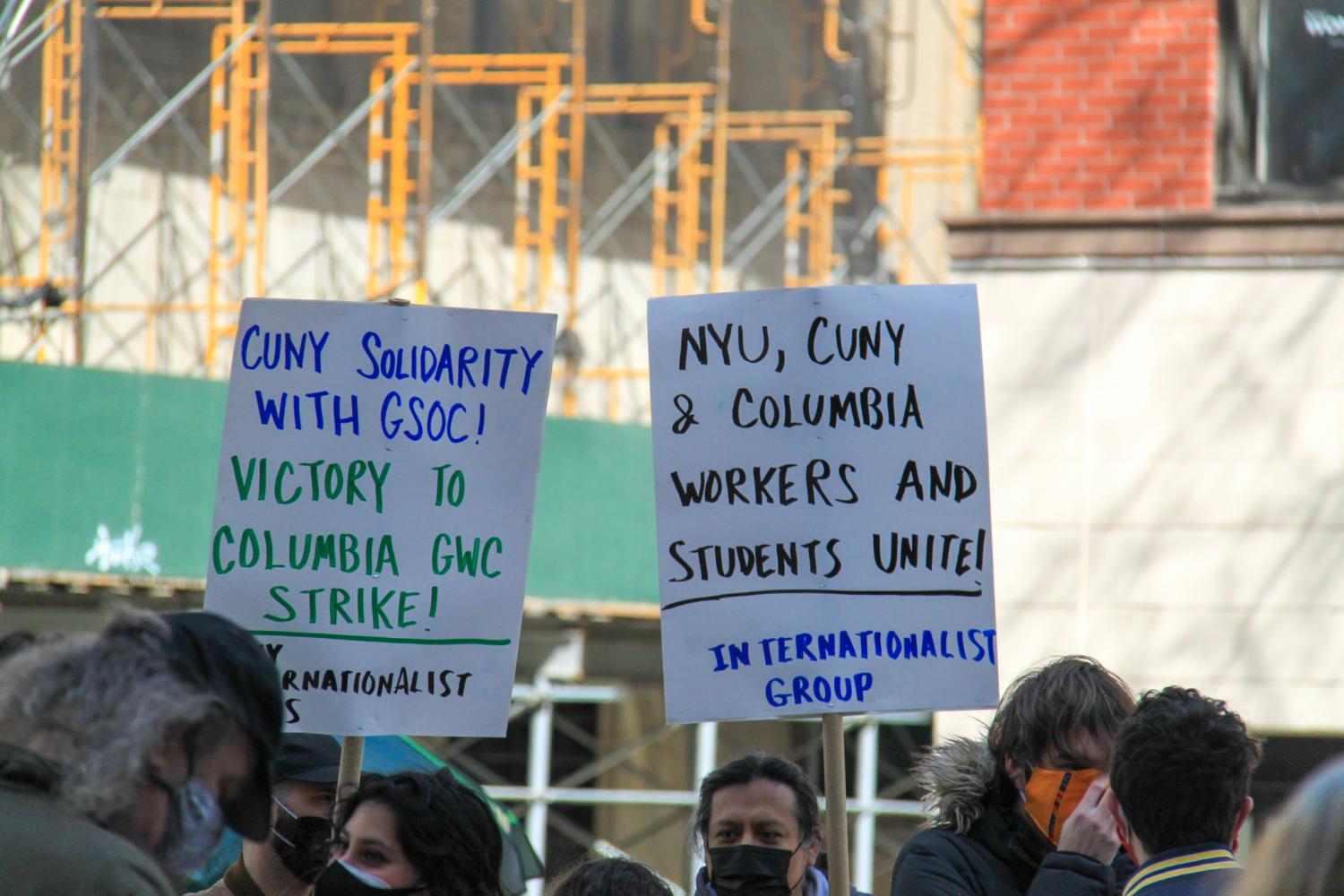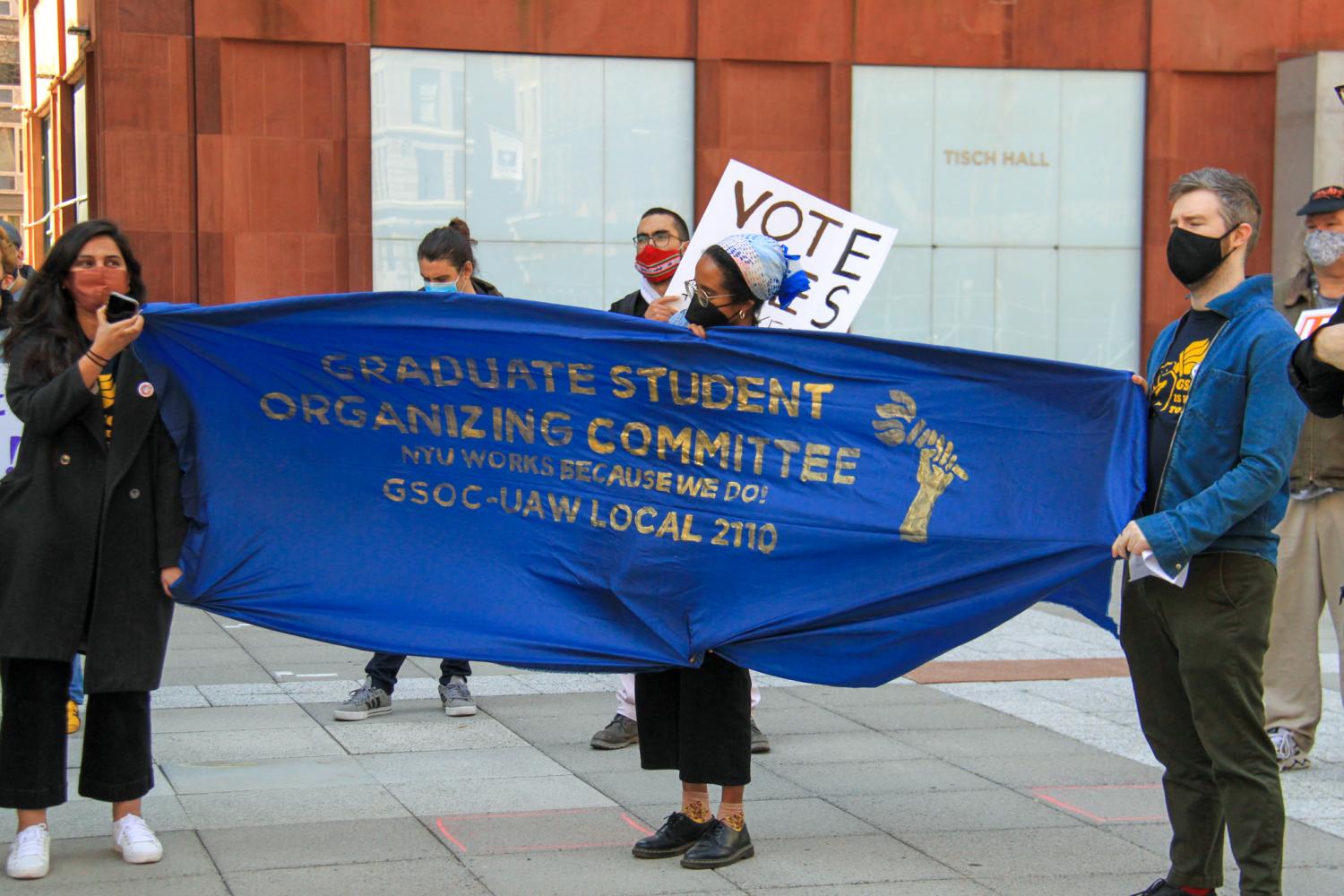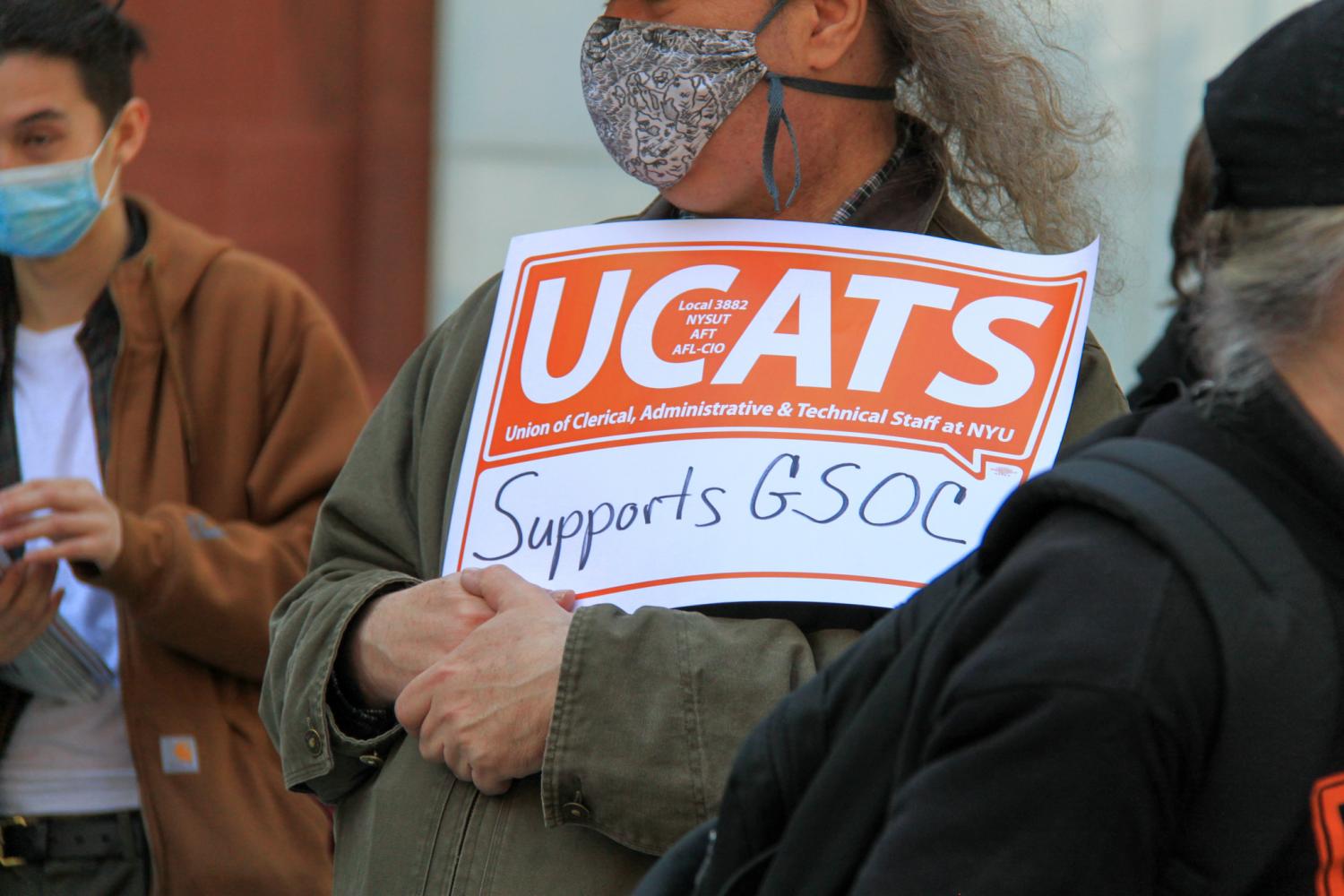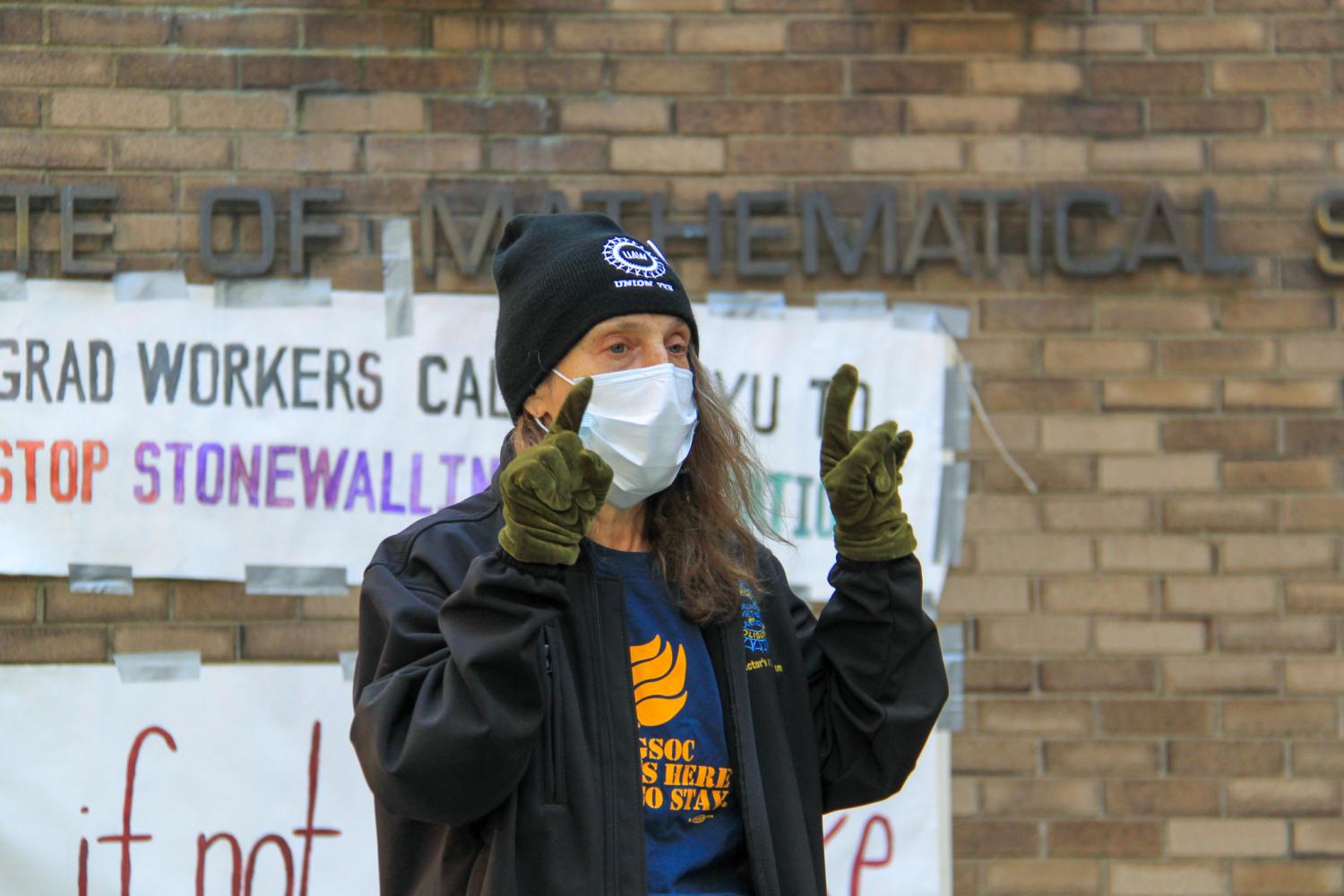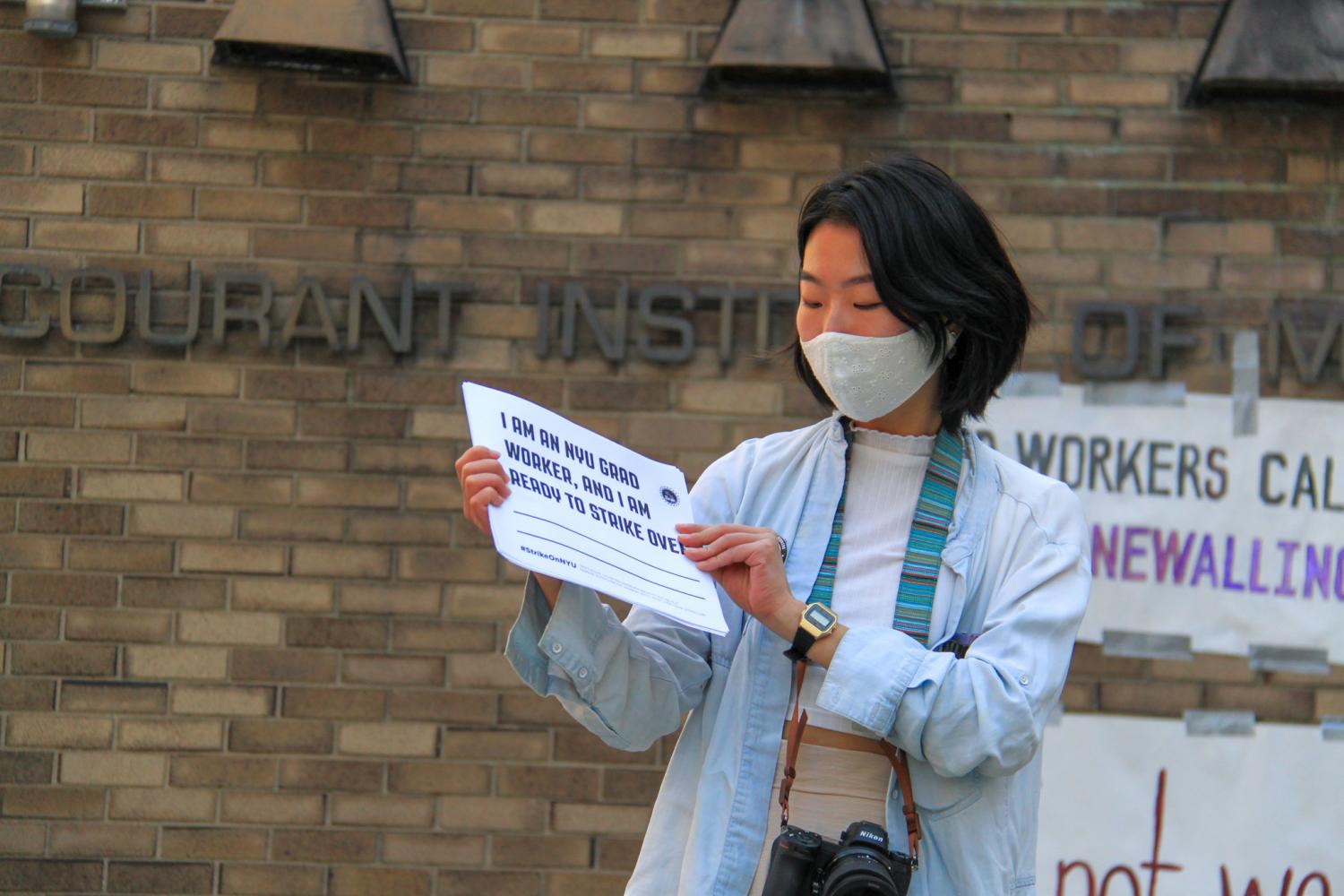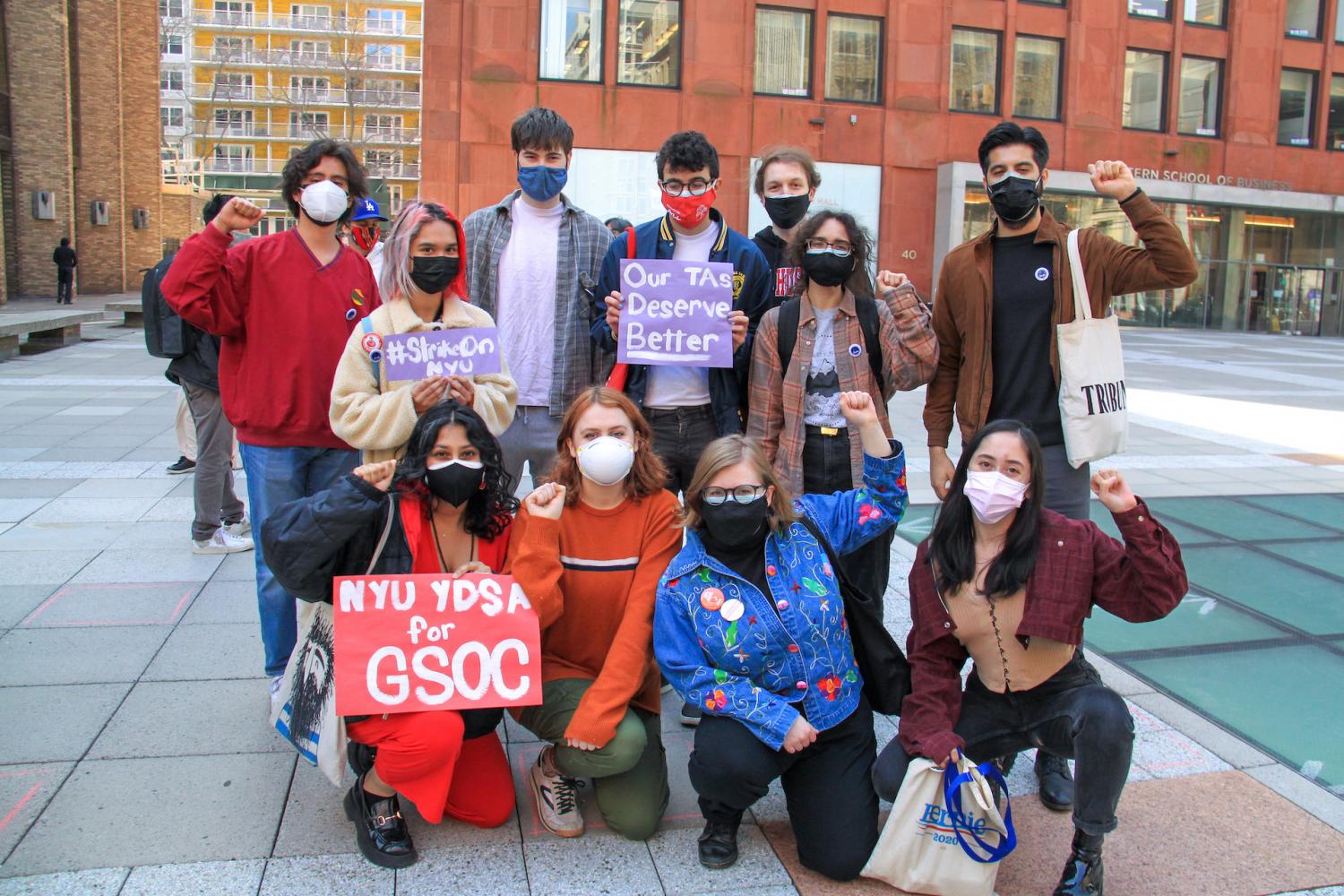Members of the Graduate Student Organizing Committee gathered at Gould Plaza yesterday to mark the start of their vote on a strike authorization. They were joined by supporters from labor unions and activist groups from across the city, including faculty members, administrative staff, and students from NYU, CUNY and Columbia. Speakers at the rally reiterated the issues addressed in GSOC’s proposed contract and urged GSOC members to vote in favor of the strike authorization.
NYU and GSOC have been bargaining over a renegotiated contract for nine months, since the expiration of the previous contract in August 2020. GSOC’s proposed contract aims to address issues facing NYU’s diverse body of graduate student workers, such as the need for a living wage, affordable healthcare and housing, visa and work requirements and access to affordable immigration lawyers and tax accountants.
GSOC said that they called a strike authorization vote because the university is stonewalling negotiations by rejecting proposals and making unconstructive counter-proposals.
In a previous statement to WSN, NYU spokesperson John Beckman said more progress would have been made if GSOC had allowed a third-party mediator to arbitrate bargaining sessions.
However, Anila Gill — a fifth-year PhD student in Cinema Studies and member of the GSOC bargaining committee — said that the mediator would only serve to legitimize NYU’s position.
Colin Vanderburg, a third-year PhD student in English and also a member of the GSOC bargaining committee, agreed with Gill.
“Simply bringing in a third party to structure the negotiations would not address the substantive issues that are at stake,” Vanderburg told WSN. “NYU has refused, at every turn, to take our demands seriously or provide meaningful counterproposals. I don’t think a mediator would address that issue.”
At the rally, GSOC members wore navy shirts printed with gold letters reading “GSOC is here to stay.” They held banners and posted signs, including one reading, “Grad workers call on NYU to stop stonewalling negotiation… If not, we strike.” Students with NYU Young Democratic Socialists of America, CUNY Internationalist Clubs, and Revolutionary Internationalist Youth carried signs expressing messages of solidarity.
Maida Rosenstein, the president of United Auto Workers 2110 — the local chapter of the national union with which GSOC is affiliated — expressed support for GSOC’s strike authorization vote and confidence that the union will win a contract.
Graduate workers spoke on various issues their proposed contract seeks to address. Emmaia Gelman, a parent of three and a PhD candidate in American Studies at the Graduate School of Arts and Science, described the university’s childcare subsidies as severely lacking.
“The subsidy that NYU provides and their support to parents — it’s so completely inadequate as to be unusable,” Gelman told the crowd. “There is literally no way I could’ve afforded to do this work without depending on my parents for their labor and financial support. It’s been a difficult arrangement — even though my family does not face the burdens of racism, immigration status trauma, low-wage employment, unstable housing that so many of our families do.”
Elsy El Khoury, an international student and PhD candidate in Chemistry, described the work and income restrictions international students face.
“We can only work at NYU because NYU is our sponsor,” El Khoury said to the crowd. “We can work somewhere else if NYU decides otherwise and allows us to. This is one of the major issues we are facing … We cannot look for other ways of getting income.”
El Khoury also emphasized the difficulties international students face in gaining access to legal support for immigration and guidance on filing taxes.
“We asked for subsidized legal assistance, which NYU provides to their employees — they rejected our demands,” she said. “We asked for subsidized access to tax accountants — NYU rejected our demand.”
According to Vanderburg, graduate student workers are paid from $25,000 to $50,000 a year. One of GSOC’s central demands is that NYU raise the base stipend to $45,000 a year for graduate student workers across all university departments.
“Based on the fact that grad student employees … are limited to 20 hours a week — and many of them work far fewer than that, we’re talking about five, maybe 10 hours a week — we think that $40 an hour is a living wage,” Vanderburg said. “We’ve made concessions on that, and our current proposal is for $38 an hour … But NYU, for months, was proposing a $1 raise for master’s students.”
Under NYU’s counter-proposal, master’s students would go from receiving $20 to $21 per hour, and PhD students would receive $22 per hour.
Stephen Rechner, president of the Union of Clerical, Administrative and Technical Staff at NYU, and Elisabeth Fay, an organizer with Contract Faculty United — which represents full-time, non-tenure-track teaching staff at NYU — also expressed support for the contract renegotiations and strike authorization vote.
“When people ask me what UCATS members do, I tell them we provide outstanding educational services to NYU students, faculty, staff and administrators,” Rechner told the crowd. “As such, we are essential workers. But GSOC members — you provide education to NYU students. You are more essential than anybody. And here we are, one year into a pandemic, and another wealthy employer is telling their essential workers they don’t deserve a living wage, or decent benefits, or healthcare, or family care.”
Fay also condemned NYU’s treatment of its graduate student workers.
“A 20-hour employment, nine months a year, does not stretch to cover 365 days,” Fay said. “As we approach this next chapter in GSOC’s history, I just want to say how proud our union is to stand in solidarity with you guys today by fighting for a fair contract, for fighting for a better and more equitable university for everybody here.”
David Klassen is an adjunct professor at the Borough of Manhattan Community College, an organizer with Rank and File Action, and a member of the CUNY’s Professional Staff Congress — the union representing full-time faculty, adjunct faculty, graduate workers and staff. A former member of GSOC, he stressed the power of strike actions and encouraged current GSOC members to vote for the strike authorization.
“I’ve seen what the credible threat of a strike can do,” Klassen said. “When I was a member of the bargaining committee here in GSOC, we would sit across a table from the negotiators, these lawyers, these bigwigs on the other side, and we would tell them what working here looked like … They would look with dead eyes back and not give an inch — just completely ignoring the conditions that we had. But then, once we voted on a strike authorization vote, and once we brought that threat into the room, that intransigence turned completely around and we got many of the things that they had said they would never ever give us.”
GSOC’s voting period for strike authorization continues until March 29. If the motion is approved by at least two-thirds of union members, the union’s organizing committee will be empowered to call a strike at their discretion.
Email Trace Miller at [email protected] and Arnav Binaykia at [email protected].


























































































































































